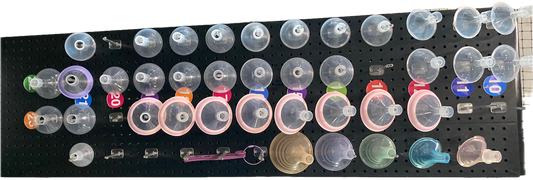
The 5 warning signs you NEED help.
Share
“I don't want to give my baby formula…my friends say I just have to tough it out for two weeks...They told me to pump in the hospital…my Pediatrician said I was starving my baby...Everyone is telling me something different!"
How Google and YouTube make things worse
There’s a time and a place for Google, YouTube and books. And it’s not when your baby is crying and you are frustrated.
The biggest reason these don't work is because they only offer tons of information without any filter. They can’t listen to you, discern subtleties and hold a space for you to vent and share your frustrations when you struggle with breastfeeding. When we are frustrated, or suffering, we need another human being to witness and listen to us. Listening with empathy is the most important part of my job as a lactation consultant.
Breastfeeding is a complex mix of intuition, positioning, timing, hormones, culture and family dynamics all mixed up with overwhelming emotions like desire, joy, sadness, frustration and anger. A lactation consultant’s skill is to look at the whole breastfeeding process, listen to your experience, including your upset and separate big problems into smaller pieces so you can solve them step by step.
You can be focused on the wrong thing and not realize it.
If you have any of these situations, it's time for help from a Lactation Consultant.
Breastfeeding problems are often complex.
There is a main cause and one or two or three things that are problems, but they aren't the root cause.
One problem I see is moms "trying to get the latch right" over and over and damaging their nipples in the process. Instead, you could attach the baby once and simply pull the baby in close and lean back to get a comfortable latch. So, before you search online, pump, use nipple shields, syringe, finger, Lact-Aid or SNS feeders, or bottle feed; Before you do anything that isn’t breastfeeding, find someone who will help you learn how to comfortably and effectively breastfeed your baby.
The four best sources of help
1. If you are in a hospital, ask for a lactation consultant. If the first can't help, ask for a different one or a helpful nurse. Keep asking for help until you have seen everyone on staff. If none of the hospital staff is able to help you, go to Step 2.
2. Call an International Board Certified Lactation Consultant (IBCLC) to come to the hospital, or to your home, or schedule an office visit with them the day you leave the hospital.
You may feel like your problem really isn't “that bad.” If you feel like this, think of the visit as education. You will receive so much information and reassurance you will realize the value immediately. Breastfeeding for the first six months typically saves $600 on formula costs alone, so there really is a net savings when you get professional help.
3. If an IBCLC is not available, call a La Leche League Leader, a Breastfeeding USA counselor, a Certified Lactation Counselor (CLC), or WIC Breastfeeding Peer Counselor.
4. Call on your tribe. What's a tribe and where do I join one?
Breastfeeding Café, La Leche League, Baby Café and Breastfeeding USA are a communities of breastfeeding moms and families that have groups that meet monthly all over the world. It’s likely there is one near you.
You may also find community groups of breastfeeding moms at hospitals, baby stores, churches, community centers, health food stores, yoga centers, on Facebook or on Meetup. If you can’t find a live group, you can find an online community in any flavor you might think of.
While some mothers find breastfeeding amazing, intuitive, easy, natural and satisfying from the first feed, many women (and babies) need a little (or a lot) of help, encouragement and support from their tribe in the beginning. Even if you find it easy, you will benefit from socializing with moms who are raising their baby through breastfeeding.
Breastfeeding is intuitive and natural, but often it's not easy to learn.
The easiest way to prepare yourself for breastfeeding is to have been breastfed and raised in a culture of breastfeeding mothers. If this is your experience, then it decreases the amount of learning you need to do when pregnant. LIving in a breastfeeding culture increases the likelihood of successful breastfeeding and plays a part in how long you will breastfeed.
If you are like most people, you haven’t had this experience. It is helpful for you to immerse yourself in pictures, videos and the company of real babies breastfeeding while you are pregnant. When you see women breastfeeding, your body begins to learn how to breastfeed. You tap into your instincts and reflexes and slowly you start to absorb the positioning, the attitude, the information and the relaxation needed to be comfortable and enjoy breastfeeding.
Research and interview lactation consultants
Interview lactation consultants, as well as pediatricians, while you are pregnant, so you know who you are calling. When you need help, you will feel comfortable asking them questions.
Breastfeeding is a sisterhood. Some have a tough initiation, others don't, but we all stick together and support breastfeeding, so we can support all our babies.








